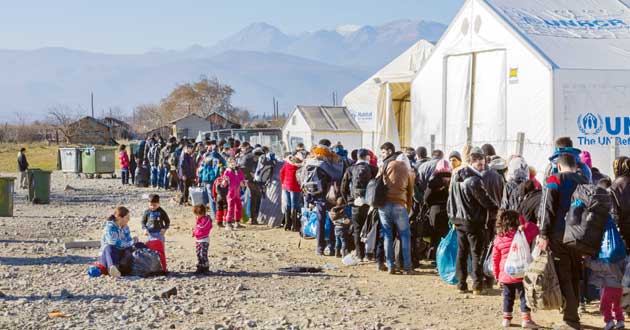A call for compassion | Evangelicals commit to refugee resettlement efforts

Rejecting fearmongering about the resettlement of Syrian refugees in the U.S., about 100 evangelical leaders are calling on Christians and their churches “to support ministries showing the love of Jesus to the most vulnerable, those in desperate need, and the hurting.”
“Our statement is to change a narrative of fear and instead focus on faith and compassion,” said Ed Stetzer, executive director of LifeWay Research in Nashville, Tenn. “Our desire is not to resettle everybody in another country. When a house is burning down, we need to put out the fire and rescue people fleeing the fire.”
Meeting on Dec. 17 at Wheaton College, outside of Chicago, evangelical leaders said in their statement, “We will motivate and prepare our churches and movements to care for refugees. We will not be motivated by fear but by love for God and others. … We cannot allow voices of fear to dominate. Instead, we commit to actions of love and compassion for refugees.” They said there are nearly 60 million displaced or refugee people worldwide, “a humanitarian crisis of unprecedented size.”
The planning event brought together top leaders from World Relief, World Vision, the Southern Baptist Convention, the Wesleyan Church, the Assemblies of God, and more than 50 other groups for dialogue in advance of a larger event on Jan. 20, designed to develop a sustainable Christian response to the global refugee crisis.
In mid-November, the Billy Graham Center for Evangelism, the Humanitarian Disaster Institute, and LifeWay Research announced they would convene what they are calling the GC2 Summit, which references the biblical Great Commission and Great Commandment from Jesus to spread the gospel to all nations and exhibit love of neighbor.
Since the deadly terrorist attacks in Paris and San Bernardino, Calif., Americans have become more fearful in general. A Dec. 9 NBC/Wall Street Journal survey of 1,000 U.S. adults found that “national security and terrorism” displaced “job creation and the economy” as the No. 1 issue for the federal government needs to address.
Much public anxiety has focused on the Obama administration’s plan during the next year to resettle in the U.S. 10,000 refugees from the Syrian civil war in addition to increasing overall refugee resettlement to 85,000, from 70,000 last year. Since October 2010, the U.S. has resettled 2,234 Syrian refugees. A November survey by Ipsos Public Affairs on behalf of World Vision found that 41 percent of respondents were fearful of Syrian refugees, a rapid rise from the 25 percent figure recorded in October.
In Syria, about 4.4 million people have fled violence to neighboring nations for shelter and safety from the nearly five-year-old civil war. Right now, the conflict in Syria creates more refugees, mostly women and young children, than in any other nation. “Moments like these are when Christians cannot remain silent and still,” the statement said.
“Critical moments like these are opportunities for us to be like Jesus, showing and sharing His love to the hurting and the vulnerable in the midst of this global crisis,” the statement said.
But the Obama administration’s plan to ramp up resettlement of Syrian refugees, which depends largely on nine nonprofit agencies, has faced sharp criticism. In Congress, House Republicans have complained that the mandatory screening of refugees is failing and risks allowing radicalized Muslims to enter the U.S. to carry out violent attacks.
So far, House critics have been unsuccessful in attempts to delay refugee resettlement until new security screening protocols are in place. State governors in Texas and Indiana have also been unsuccessful in stopping resettlement of Syrian refugees in their states this month.
Others have accused refugee resettlement agencies of having a financial conflict of interest in their advocacy for refugee resettlement because the agencies receive a commission when a refugee repays government loans for travel to the U.S. In response, resettlement agency leaders say the commissions that they receive are necessary to sustain their programs operationally.
During a press conference, evangelical leaders said more churches are stepping forward to resettle refugees. Agency leaders emphasized that they offer their services based on need, not religious affiliation.
“We unashamedly want people to see the love of Christ in the actions that we manifest (as) we render aid,” said Frank Page, president and CEO of the Southern Baptist Convention. “But never is ministry or aid dependent on one’s acceptance of the Gospel message.”
Since the start of the Syrian conflict, the U.S. has spent $4.5 billion on humanitarian assistance inside Syria and in the region, the largest amount of any nation.
— by Timothy C. Morgan | RNS
For theological foundations and footnotes, click here. GC2 invites others to sign the declaration and learn more about its January 20 summit.




